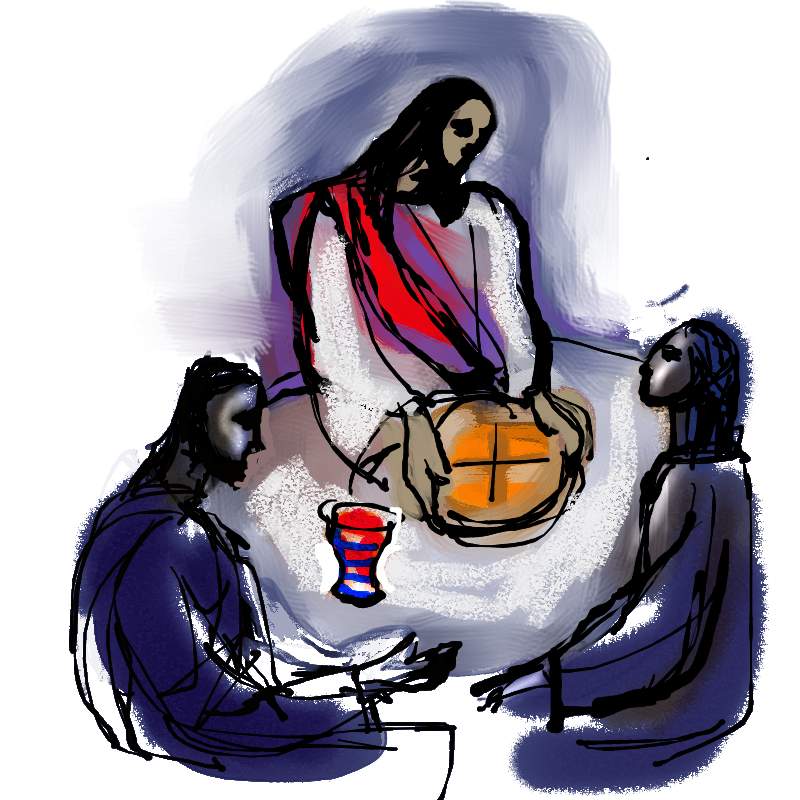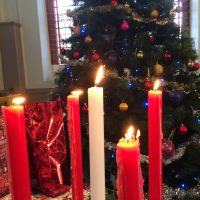Sermon given at St. Andrews Ealing, 5th August 2018 by the Revd Sue McCoan
Psalm 78:23-29
John 6:24-35
Jesus said, ‘I am the bread of life’. Words we use often – I use them at the beginning of communion – and it’s so familiar, we can say it without really giving it much thought. Today I thought we might reflect on some of the richness of meaning in these words.
The reading, as you probably know, follows directly on from the account of Jesus feeding the 5000. This is the day after that event, when the people who have been fed have had time to reflect on what has happened. Actually their first reflection is, ‘might there be more?’ They saw the disciples getting into the boat last evening, and they know Jesus wasn’t with them, so they still think he might be around somewhere on the far side of the lake and, who knows, maybe he’s got something in mind for breakfast?
What they don’t realise, of course, is that Jesus took the short cut back, walking across the water. But they do eventually give up and go back themselves, and to their surprise, there he is. And they engage in a conversation, in which the people and Jesus seem to be teasing out what they can know about each other.
Jesus challenges them to look beyond the immediate wonder of the free food. In all the gospels, we have many accounts of Jesus doing amazing things. In John’s gospel it is particularly brought out that the amazing things are indeed amazing, but they are not the thing. They are signs, pointing to a deeper and even more amazing meaning.
A while ago, I was chatting to my mum, and she said, have you seen those adverts that have bits of the Wizard of Oz in them? (They’ve used the original footage, and doctored it so that instead of meeting the Wizard, they meet a mortgage adviser; it’s based on Dorothy’s catchphrase, ‘there’s no place like home’). Mum thought they were really clever, and so they are. But then I said, can you remember what they are advertising? And there was a bit of um and err and then, no, not really. (In case you’re wondering, it’s Halifax Building Society).
It’s possible to see the signs, even signs that are designed to point you at something else, and still not see what it is they are pointing too.
Jesus knows the people are interested in the food he provided, but that food won’t last – they will be hungry again tomorrow. What they could look for from him is the food that lasts, the food of eternal life. Feeding a crowd with bread and fish is just a symbol of that eternal life.
OK, that’s got them interested, or at least some of them. But then, how do we know that Jesus is someone we can believe in? The people go back to their favourite benchmark, Moses. The bread that Jesus gave them yesterday was just bread, but when Moses fed his people, he fed them with manna and that came from the sky so that’s really bread from heaven, we can see the miracle there.
Once again, they are looking at the sign, not at the meaning. It’s not about the bread, or the manna; it’s about the God whose generosity provides whatever bread it is that they get. And God who gave the manna, God who gave them barley bread yesterday, is God who is alive in Jesus and standing right in front of you now and can give you more than you can even dream of asking for – so enough about the sandwiches!
Jesus is the bread of life, and his feeding of the crowd gives some insight into what this might mean. So let’s look, then, at three possible insights.
Firstly, Jesus as the Bread of Life gives an insight into the generosity of God. Jesus doesn’t produce just enough food to ward off the worst of their hunger, to keep them going through to the next morning. He provides so much that there are 12 baskets of leftovers. Here is abundance: Why feed one person when you can feed thousands? Why make wine for a meal when you could make it for a whole wedding feast? Why make one kind of bird, or tree, or flower, when you can make thousands of different kinds?
God is a god of abundance and this abundance pours out in overflowing generosity. Sometimes we limit how much we can receive; but there is no limit on what God gives.
Secondly, Jesus the Bread of Life also gives us an insight into the cost of that generosity. Not a financial cost to Jesus, because he hasn’t got any money – you notice that the feeding miracle starts with somebody else’s food. The cost for Jesus is the cost to his security. Tucked away at the end of the story of the feeding comes the verse, v15, ‘Jesus, realising that they meant to come and seize him to proclaim him king, withdrew again to the hills by himself’.
Every time Jesus does something spectacular in public, he runs the risk of it being misinterpreted. In other places he is accused of breaking the law, or of using the power of evil spirits. Here, the trouble is the people who see what he has done as the work of God, but want him to be a different kind of Messiah, one who will restore the earthly kingdom of Israel. Opening up the abundance of God also opens up, for Jesus, the possibility that his ministry will be derailed. And yet he still does it. And ultimately, making that choice to keep giving rather than to keep safe, is what leads Jesus to the cross.
Thirdly, though, Jesus the Bread of Life reminds us that God wants to nourish us. That includes food for our bodies – we do need to stay alive. We have more choice, most of us, than the people at the time of Jesus did, about what food we eat; we honour God by choosing wisely and keeping ourselves well. But God’s nourishment is also about nourishing our souls, and that includes the things that give us joy. So yes, we can have the occasional treat and if it truly delights us then it is not sinful no matter what Weightwatchers may say. Just be a tiny bit careful of when it stops being a treat and edges over into comfort eating.
Comfort eating is a trap, because the comfort doesn’t last but the weight you put on does, and then you feel bad about that as well. I’ve been there. There is a kind of emptiness that feels like hunger but is really a deeper hollow than that. It’s a sign that we need deeper nourishment.
Jesus the Bread of Life offers us the very deepest nourishment, the love of God. And when we know that we are truly loved by God then we can find other ways to nourish ourselves, other ways to deal with our emptiness. For me, it’s looking at paintings, or anything with beautiful colours.
And that’s on top of our daily nourishment of prayer and bible reading. In factScripture Union produce Bible reading notes that are called ‘Daily Bread’ – you can order them online.
So Jesus the Bread of Life shows us the generosity of God, bears the cost of that generosity, and seeks to nourish us in every sense. And in turn, Jesus calls us to do the same for others. Today is communion, when we particularly think of Jesus the bread of life. I’d like to end by sharing with you a prayer by Susan Durber, from the 2012 Prayer Handbook, reflecting on one of the phrases from the Communion Service in the Book of Common Prayer.
We do not presume to come to this thy table, trusting in our own righteousness, but in thy manifold and great mercies.
Merciful God,
you make me welcome at your table
and I am glad to be here.
I know that I have not earned my place
through good works
or through devotion and faith.
I know that I have no right
and no special favour,
no reserved seat or ticket.
I am here because you welcome me
and make space for me
and offer me the gift of yourself
every time I come.
Give me grace
that I may invite to my table and my life
many who have no reason to be there,
but in whom I will find your presence
and your holiness.
Save me from every presumption
and every false trust,
that I may take for granted
only your grace and your love,
and share them freely with others.
Susan Durber
URC Prayer Handbook 2012




